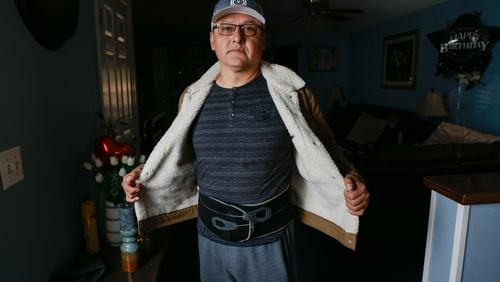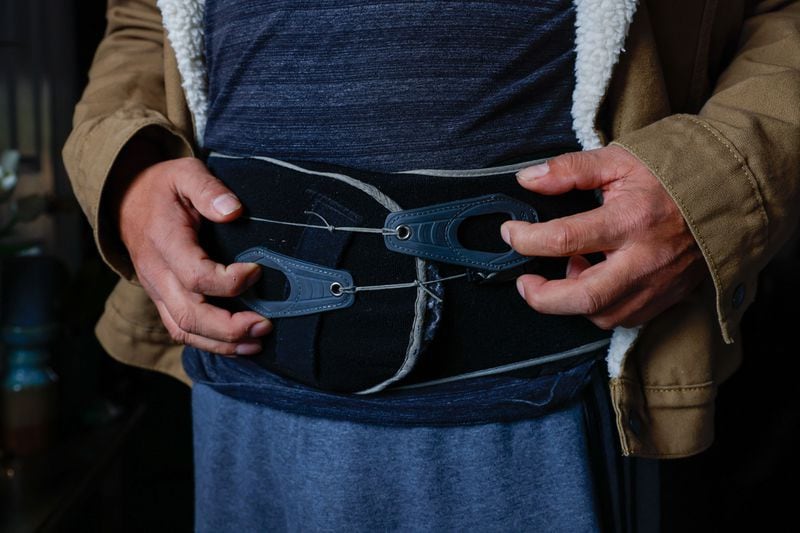Jovito Caballero, an immigrant from Mexico, began working in Gainesville poultry plants as soon as he settled in the area in 1998.
Throughout his years of service in the industry – most of them spent working for Pilgrim’s Pride, his most recent employer – the Mexican immigrant cycled through different jobs. The day-to-day responsibilities varied, but the intense physical nature of the work never lessened. By the time 2023 rolled around, he worked as a maintenance technician – until he injured his back lifting a machine part that weighed close to 80 pounds.
After the accident, Caballero said Pilgrim’s Pride asked him to get his doctor to sign a form stating that the injury was not work related. Caballero didn’t go along with that and was fired shortly afterward. He is now on the hook for a back surgery he needs – and he is suing the company over his termination.
“My world came crashing down,” Caballero said of losing his job after the lifting injury. “I felt bad because I was hurt, and I was fired, and I didn’t know where to turn to.”
Pilgrim’s Pride’s parent company JBS did not respond to a request for comment for this story. In court filings, the company has denied Caballero’s allegations.
Advocates say Caballero’s story illustrates the challenges faced by immigrant poultry workers when they get hurt on the job, a too-common occurrence given the hazardous nature of meatpacking work. Although immigrant workers are allowed to receive medical care and paid leave through the workers’ compensation system regardless of their legal status, they may not have the information or language skills necessary to successfully file a claim.
Sometimes, employers may exploit their workforce’s vulnerabilities, advocates say, and take steps to avoid the cost of providing all of the compensation workers may be entitled to, including letting go of injured workers and replacing them with new ones, which may intimidate others from coming forward.
Credit: Miguel Martinez
Credit: Miguel Martinez
“I believe that this is their business model, high turnover, so that they don’t have to pay for injured workers,” Debbie Berkowitz, a former chief of staff at the Occupational Safety and Health Administration (OSHA) and a current fellow at Georgetown University’s Kalmanovitz Initiative for Labor and the Working Poor. “I don’t think the industry is at all worried about liability.”
That’s a characterization Mike Giles would disagree with. He is the president of the Georgia Poultry Federation, a group that has been advocating for the industry since 1951.
“Poultry companies are committed to avoiding injuries in the first place, but should they unfortunately happen, the commitment is also there to strictly follow the workers’ compensation laws and rules of the state of Georgia,” he said in a statement. “I disagree completely with any claim that poultry companies are systematically denying employees’ access to workers’ compensation for injuries sustained in the workplace.”
According to Berkowitz, the U.S. poultry industry would grind to a halt without immigrant and Hispanic workers, an analysis that Gainesville demographics seem to corroborate. In Gainesville, nicknamed the ‘Poultry Capital of the World,’ the Hispanic population more than doubled in 30 years. Roughly four in 10 city residents are now Latino, census data show. And according to estimates from the Pew Research Center, unauthorized immigrants in 2016 made up over 11.5% of Gainesville’s total population, virtually the largest proportion out of all U.S. metro areas.
Georgia reportedly produces more than 31 million pounds of chicken every day, more than any other state. Giles says that poultry accounts for nearly half of all agricultural production in the state, from a value standpoint. It’s a hazardous occupation: According to a 2019 report from Human Rights Watch, workers at meat and poultry processing plants suffer some of the highest rates of severe occupational injury in the U.S. A recent study of OSHA data across industries from 29 states, including Georgia, found that two meat and poultry producers – Tyson Foods and JBS – are among the top eight employers with the highest number of severe injury reports, despite having a much smaller workforce than other organizations on top of the list, such as Walmart or the U.S. Postal Service.
‘They do whatever they want with us’
Claudia Caycho-Acosta worked for years at an Atlanta-area injury law firm before starting her own practice in 2022. The Peruvian immigrant and Norcross High School graduate works often with Hispanic immigrants and Spanish-speakers, representing them in personal injury and workers’ compensation cases. She is part of Caballero’s legal team and in the past, she represented survivors of the deadly 2021 nitrogen gas leak at Foundation Food Group, also in Gainesville.
Caycho-Acosta explained that when workers get hurt on the job, the employer should allow a consultation with a doctor to assess the severity of the injury. If the doctor imposes a light duty restriction, the employer must either abide by that restriction or pay the worker to stay home, in addition to covering medical expenses.
In practice, Berkowitz and Caycho-Acosta say that doesn’t always happen. Employers may try to handle all but the most urgent of cases at in-house first-aid clinics – which advocates say may prevent injuries from being reported to OSHA. There may also be attempts at obfuscating how the workers’ compensation process works.
“I have heard supervisors telling people, ‘Oh, no, maybe you slept wrong, and that’s why your arm is hurting,’ or, ‘This isn’t workers’ comp, because you have to report it within two days.’ And that’s wrong,” she said. “You have 30 days to report your injury under the law. And this is something that a lot of injured workers don’t know.” Berkowitz added that she’s heard of multiple cases across the country of workers being asked to get doctors to sign forms of the kind Caballero was given.
When workers are undocumented, they are even more vulnerable to intimidation.
“It’s really nerve-wracking when you have an accident, and you have a supervisor asking you, ‘Hey, by the way, you need to bring me your Social Security documents.’ I mean, that’s kind of like hinting, ‘Hey, now that you got injured, we’re going to look into your documents.’ But honestly, in the workers’ compensation arena, that’s not relevant,” Caycho-Acosta said.
Ken Thaxton is another member of Caballero’s legal team. He says past clients of his had their incomes cut off after being injured and ordered by doctors to switch to lighter duty jobs – because at that point they were asked to show proof of U.S. citizenship that they couldn’t produce.
Thaxton said in his view, unauthorized immigrants are “a class of workers that systematically cost you less when they’re hurt.”
Giles refuted their claims, explaining that it is illegal for employers to probe or ask questions about a worker’s immigration status. He noted that on-site clinics inside poultry plants are an asset for workers, who might turn to those facilities for general health care. He also said employers require that accidents and injuries be reported immediately, in part so that management can address hazardous workplace conditions before others get hurt.
Labor advocates say Caballero’s decision to file a lawsuit over the treatment he received after getting injured is rare, because of widespread fear of retaliation. Caballero says it reflects his disappointment.
“It was too many years spent working there for things to have played out like this,” he said. “Because we’re immigrant, because we’re Hispanic, they do whatever they want with us.”
Credit: Miguel Martinez
Credit: Miguel Martinez
About the Author









